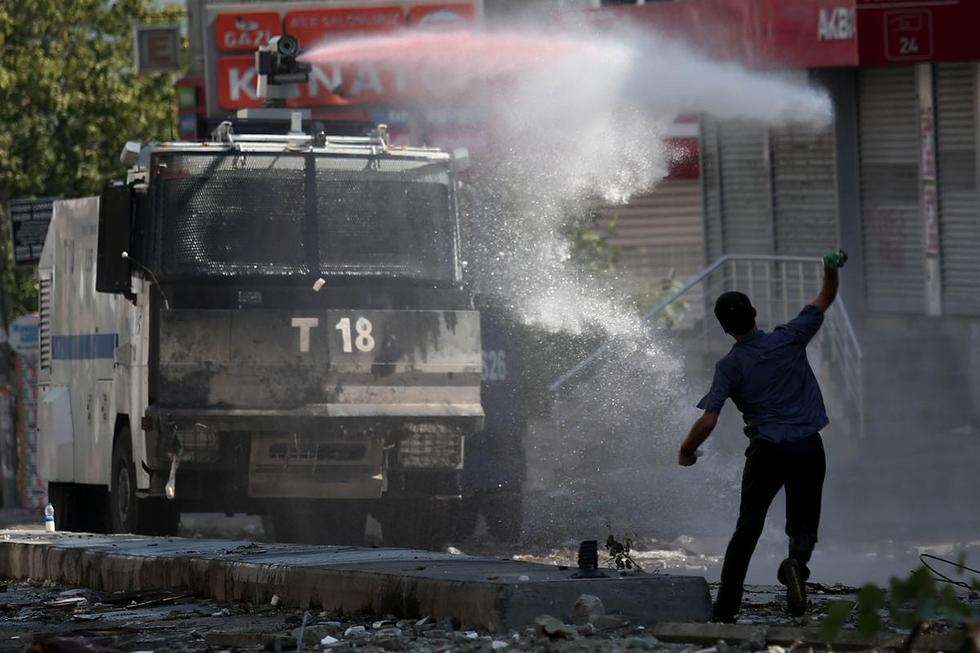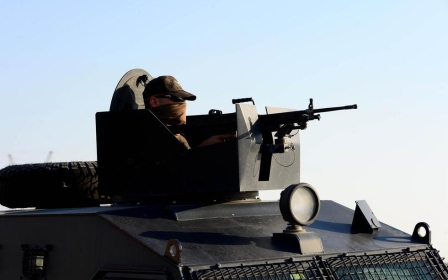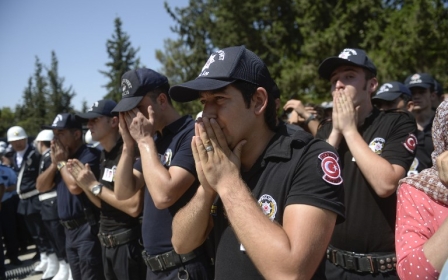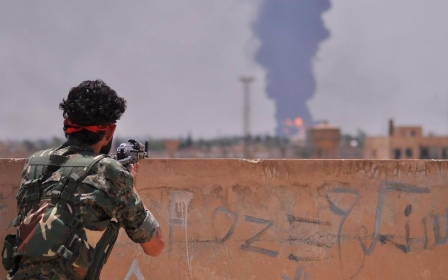Turkey vows to fight PKK until group is disarmed

Turkey is set to be an active member of the United States-led international coalition against the Islamic State group, after dithering on the sidelines for a year.
Mevlut Cavusoglu, the foreign minister stated that Turkey will join the coalition airstrikes.
“Turkey is going to actively join the air attacks,” he said while on a visit to Portugal, but Prime Minister Ahmet Davutoglu ruled out on sending ground troops into Syria.
For the first time since the Syrian conflict began in March 2011, Turkish military jets began shelling IS targets in Syria on Thursday.
Turkish authorities have embarked on a crackdown that has so far has culminated in the arrest of over 1,000 people, including 37 foreigners, with ties to IS, the outlawed Kurdistan Workers’ Party (PKK), and other leftist groups.
The Prime Minister’s Office of Public Diplomacy released a statement on Monday saying that 1,050 suspects have been arrested by security officials since the country’s “anti-terrorist operations” in the country began.
On Friday, airstrikes hit PKK targets in northern Iraq, for the first time in two and a half years. Military planes targeted PKK positions inside and outside Turkey again on Sunday.
Airstrikes on IS and PKK targets
Turkey has also finally given the green light to the United States to use its Incirlik airbase against the Islamic State, with officials speculating that the first US bombing raids on IS could start at the beginning of August.
“The goal is to establish an IS-free zone and ensure greater security and stability along Turkey’s border with Syria,” said a US official who asked not to be named to AFP.
Consequently, Davutoglu is regarded as fighting on two fronts: airstrikes on IS targets, and shelling PKK positions.
Speaking on condition of anonymity, a Turkish official revealed to AFP that “operations will, if needed, continue until the PKK terror command centres...and all depots to store arms to be used against Turkey are destroyed.”
Davutoglu later confirmed that the military will carry on its operation against Kurdish militants until the group is disarmed.
“We will continue our fight…until we obtain a certain result,” he said.
Tensions boil over
The recent escalation in Turkey’s role followed through from a suicide bomb attack last Monday that killed 32 young activists in Suruc in the southeastern province of Sanliurfa, which was claimed by IS.
The attacks on the PKK led to the organisation - considered a terrorist organisation by Turkey, the EU and the US - announcing that the two-year ceasefire with the Turkish government was effectively over.
“The ceasefire has been unilaterally ended by the Turkish state and the Turkish military,” the PPK said in a statement released on its website. “The truce has no meaning anymore after these intense airstrikes by the occupant Turkish army.”
The peace process between PKK and the Turkish government began in 2012 after 30 years of violence, with the former fighting for autonomy since 1984.
Yet Mehmet Solmaz, the news editor for Turkey's Daily Sabah, pointed out that the PKK have announced the end of the ceasefire twice in the last several weeks.
“In 2015 alone, the PKK conducted 176 bombing attacks,” Solmaz told the Middle East Eye. “[The] airstrikes are a sort of response to make PKK come to its senses and be serious about reconciliation.”
“Turkey decided to adopt its former policies at a tougher level, and at the same time it’ll continue democratisation steps for the Kurds,” he added.
Since the suicide attack in Suruc, many Kurds were further incensed by the Turkish government’s policies on Syria, with many believing that the government tolerated the presence of IS affiliates and facilitated their entry across the border into Syria.
Tensions boiled over as on Wednesday, HPG, the armed wing of the PKK, claimed responsibility for the killing of two police officers as revenge for the Suruc attack.
In light of accusations levelled at Turkey by the Syrian Kurdish People’s Protection Units (YPG), who charged that Turkish tanks preemptively hit its positions and those of its allied Arab rebels in the Zur Maghar village in Aleppo, Turkey has called for an extraordinary meeting with NATO ambassadors in Brussels on Tuesday to discuss its operations.
Parliament speaker Ismit Yilmaz stated that on Wednesday, an extraordinary meeting with Turkey’s four main political parties will be held, following the Republican People’s Party (CHP) call to discuss military operations against Kurdish rebels and IS.
While some accuse Turkey of using the airstrikes against IS targets as a pretext to quash the PKK, Mehmet Solmaz maintains that the government is worried about the IS threat.
“IS is a threat to Turkey,” Solmaz said. “At the same time its presence near the border brings false accusation against the Turkish government. Even though [the military targeted] IS for three days in a row, and arrested [Kamil Abu Sultan] Daghestani, a senior IS recruiter, the government is still accused of having links with IS.”
AKP dragging Turkey into ‘civil war’
Analysts and Turkish opposition officials have pointed to the fact that Turkey’s recent entry into the Syrian fray is indicative of party politics at hand.
President Tayyip Recep Erdogan’s party, the Justice and Development Party or AKP, won the recent elections in the June polls but failed to secure single-party rule, for the first time in ten years. The recent involvement of Turkey’s military against Kurdish groups and the IS, according to the leader of the pro-Kurdish Peoples’ Democratic Party (HDP) Selahittin Demirtas, is attempting to regain its status by dragging Turkey into a “civil war.”
“A temporary government came as the AKP-led government started a comprehensive military campaign against terror inside Turkey and through cross border operations in Iraq and Syria,” Demirtas told reporters today. “Turkey has already been bogged down the Middle East quagmire because of wrong policies in Syria.”
“The AKP, as a ruling party already knee-deep in corruption, has begun wrathfully seeking ways to become the government once again,” he added, blaming the government for the deaths it caused by the recent attacks inside Turkey.
“These massive cross-border operations are the government’s efforts to save itself,” he continued. “These are operations of the palace. The palace has established its own state with a massive budget, cover operations, and institutions.”
Meanwhile, Turkish Foreign Minister Mevlut Cavusoglu urged HDP to “act like a political party and cut ties with the terrorist PKK.”
“We expect the HDP to act like a political party and cut its ties with the terrorist PKK,” Cavusoglu said, accusing HDP of not only failing to condemn the recent killings of policemen that the PKK claimed, but also of supporting these acts.
New MEE newsletter: Jerusalem Dispatch
Sign up to get the latest insights and analysis on Israel-Palestine, alongside Turkey Unpacked and other MEE newsletters
Middle East Eye delivers independent and unrivalled coverage and analysis of the Middle East, North Africa and beyond. To learn more about republishing this content and the associated fees, please fill out this form. More about MEE can be found here.




